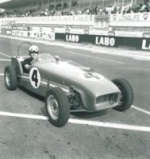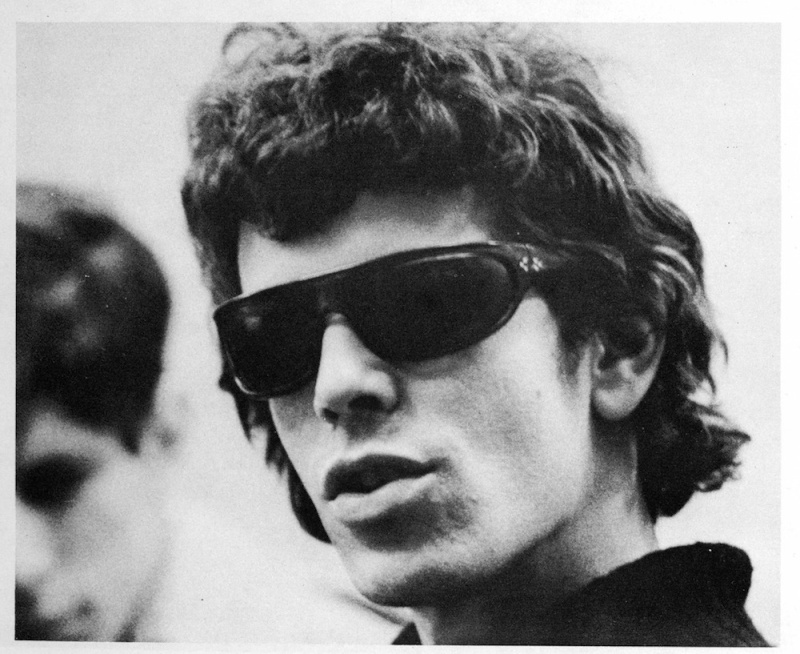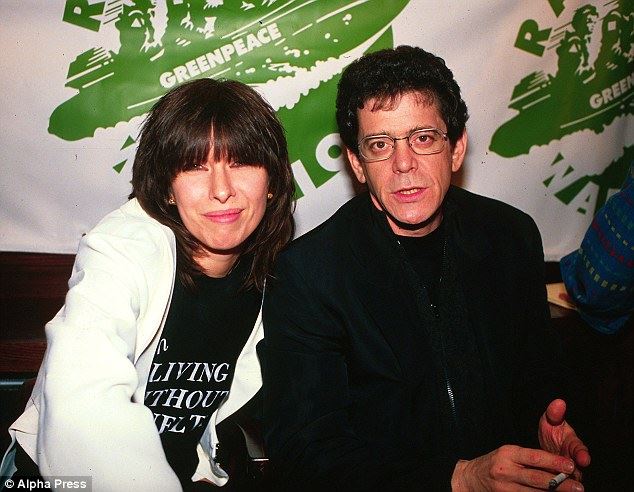Just a perfect day.
+6
Dekker
bip bip
Philimael
Seven
Francesco
Richard
10 participants
Forum motos anciennes BMW :: On a posé les outils , on se retrouve pour discuter :: Entre nous :: MUSIQUE
Page 1 sur 1
 Re: Just a perfect day.
Re: Just a perfect day.
Encore un  ... une partie de ma jeunesse qui part ... RIP
... une partie de ma jeunesse qui part ... RIP
 ... une partie de ma jeunesse qui part ... RIP
... une partie de ma jeunesse qui part ... RIPDernière édition par Seven le Dim 27 Oct 2013 - 19:25, édité 1 fois

Seven
 Re: Just a perfect day.
Re: Just a perfect day.
C'est nul de vieillir, va falloir s'habituer à voir partir tous ceux qu'on aime, tant qu'on sera là....
J'aimais beaucoup Lou Reed. L'album "Berlin" m'a accompagné pendant des années. Et bien sûr Take a walk on....., Perfect day, Heroin, rock'n'Roll, que des grandes choses....

Francesco
 Re: Just a perfect day.
Re: Just a perfect day.
La version française par Starshooter était rigolote : sweet jane = hygiène (paroles  )
)
https://www.youtube.com/watch?v=vCIEBmx7nm8
extraits paroles :
Quand je vais au drugstore / Acheter des magazines
Je n’oublie jamais d’enfiler des gants / Pour tripoter les livres
Ce n’est pas par maniaquerie / Ou pour faire l’élégant
C’est simplement parce que j’ai peur / Des microbes virulents
Hygiène…
Quand j’ai embrassé une fille / Très vite, je me lave les dents
Et après l’amour / Vite un bain moussant
J’exige de ma partenaire / Des sous vêtements
Légers, sexy, en coton blanc / Qui sentent le pepsodent
hygiène
 )
)https://www.youtube.com/watch?v=vCIEBmx7nm8
extraits paroles :
Quand je vais au drugstore / Acheter des magazines
Je n’oublie jamais d’enfiler des gants / Pour tripoter les livres
Ce n’est pas par maniaquerie / Ou pour faire l’élégant
C’est simplement parce que j’ai peur / Des microbes virulents
Hygiène…
Quand j’ai embrassé une fille / Très vite, je me lave les dents
Et après l’amour / Vite un bain moussant
J’exige de ma partenaire / Des sous vêtements
Légers, sexy, en coton blanc / Qui sentent le pepsodent
hygiène
bip bip
 Re: Just a perfect day.
Re: Just a perfect day.
Ma reprise préférée, et de loin



:
Dernière édition par Francesco le Lun 28 Oct 2013 - 20:31, édité 1 fois

Francesco
 Re: Just a perfect day.
Re: Just a perfect day.
Une voix sublime ....! Une incarnation du Rock'n Roll ...! ( Rien que ça ?  )
)

 )
)

Dekker
 Re: Just a perfect day.
Re: Just a perfect day.
Super voix. Connaissais pas!Francesco a écrit:
Ma reprise préférée, et de loin


:


J.marc
 Re: Just a perfect day.
Re: Just a perfect day.
Bonsoir
Ouais j'ai encore ses 33 tour vinyle, vu en concert à Dijon (me rappelle plus la date il était costaud l'acide....)
j'ai encore ses 33 tour vinyle, vu en concert à Dijon (me rappelle plus la date il était costaud l'acide....)
Ouais
 j'ai encore ses 33 tour vinyle, vu en concert à Dijon (me rappelle plus la date il était costaud l'acide....)
j'ai encore ses 33 tour vinyle, vu en concert à Dijon (me rappelle plus la date il était costaud l'acide....) 
DENIS
 Re: Just a perfect day.
Re: Just a perfect day.
More
Trouvé grâce à un lien de JagBruno, cette "nécro" écrite par Patti Smith dans le New Yorker.
On Sunday morning, I rose early. I had decided the night before to go to the ocean, so I slipped a book and a bottle of water into a sack and caught a ride to Rockaway Beach. It felt like a significant date, but I failed to conjure anything specific. The beach was empty, and, with the anniversary of Hurricane Sandy looming, the quiet sea seemed to embody the contradictory truth of nature. I stood there for a while, tracing the path of a low-flying plane, when I received a text message from my daughter, Jesse. Lou Reed was dead. I flinched and took a deep breath. I had seen him with his wife, Laurie, in the city recently, and I’d sensed that he was ill. A weariness shadowed her customary brightness. When Lou said goodbye, his dark eyes seemed to contain an infinite and benevolent sadness.
I met Lou at Max’s Kansas City in 1970. The Velvet Underground played two sets a night for several weeks that summer. The critic and scholar Donald Lyons was shocked that I had never seen them, and he escorted me upstairs for the second set of their first night. I loved to dance, and you could dance for hours to the music of the Velvet Underground. A dissonant surf doo-wop drone allowing you to move very fast or very slow. It was my late and revelatory introduction to “Sister Ray.”
Within a few years, in that same room upstairs at Max’s, Lenny Kaye, Richard Sohl, and I presented our own land of a thousand dances. Lou would often stop by to see what we were up to. A complicated man, he encouraged our efforts, then turned and provoked me like a Machiavellian schoolboy. I would try to steer clear of him, but, catlike, he would suddenly reappear, and disarm me with some Delmore Schwartz line about love or courage. I didn’t understand his erratic behavior or the intensity of his moods, which shifted, like his speech patterns, from speedy to laconic. But I understood his devotion to poetry and the transporting quality of his performances. He had black eyes, black T-shirt, pale skin. He was curious, sometimes suspicious, a voracious reader, and a sonic explorer. An obscure guitar pedal was for him another kind of poem. He was our connection to the infamous air of the Factory. He had made Edie Sedgwick dance. Andy Warhol whispered in his ear. Lou brought the sensibilities of art and literature into his music. He was our generation’s New York poet, championing its misfits as Whitman had championed its workingman and Lorca its persecuted.
As my band evolved and covered his songs, Lou bestowed his blessings. Toward the end of the seventies, I was preparing to leave the city for Detroit when I bumped into him by the elevator in the old Gramercy Park Hotel. I was carrying a book of poems by Rupert Brooke. He took the book out of my hand and we looked at the poet’s photograph together. So beautiful, he said, so sad. It was a moment of complete peace.
As news of Lou’s death spread, a rippling sensation mounted, then burst, filling the atmosphere with hyperkinetic energy. Scores of messages found their way to me. A call from Sam Shepard, driving a truck through Kentucky. A modest Japanese photographer sending a text from Tokyo—“I am crying.”
As I mourned by the sea, two images came to mind, watermarking the paper- colored sky. The first was the face of his wife, Laurie. She was his mirror; in her eyes you can see his kindness, sincerity, and empathy. The second was the “great big clipper ship” that he longed to board, from the lyrics of his masterpiece, “Heroin.” I envisioned it waiting for him beneath the constellation formed by the souls of the poets he so wished to join. Before I slept, I searched for the significance of the date—October 27th—and found it to be the birthday of both Dylan Thomas and Sylvia Plath. Lou had chosen the perfect day to set sail—the day of poets, on Sunday morning, the world behind him. ♦
Trouvé grâce à un lien de JagBruno, cette "nécro" écrite par Patti Smith dans le New Yorker.
On Sunday morning, I rose early. I had decided the night before to go to the ocean, so I slipped a book and a bottle of water into a sack and caught a ride to Rockaway Beach. It felt like a significant date, but I failed to conjure anything specific. The beach was empty, and, with the anniversary of Hurricane Sandy looming, the quiet sea seemed to embody the contradictory truth of nature. I stood there for a while, tracing the path of a low-flying plane, when I received a text message from my daughter, Jesse. Lou Reed was dead. I flinched and took a deep breath. I had seen him with his wife, Laurie, in the city recently, and I’d sensed that he was ill. A weariness shadowed her customary brightness. When Lou said goodbye, his dark eyes seemed to contain an infinite and benevolent sadness.
I met Lou at Max’s Kansas City in 1970. The Velvet Underground played two sets a night for several weeks that summer. The critic and scholar Donald Lyons was shocked that I had never seen them, and he escorted me upstairs for the second set of their first night. I loved to dance, and you could dance for hours to the music of the Velvet Underground. A dissonant surf doo-wop drone allowing you to move very fast or very slow. It was my late and revelatory introduction to “Sister Ray.”
Within a few years, in that same room upstairs at Max’s, Lenny Kaye, Richard Sohl, and I presented our own land of a thousand dances. Lou would often stop by to see what we were up to. A complicated man, he encouraged our efforts, then turned and provoked me like a Machiavellian schoolboy. I would try to steer clear of him, but, catlike, he would suddenly reappear, and disarm me with some Delmore Schwartz line about love or courage. I didn’t understand his erratic behavior or the intensity of his moods, which shifted, like his speech patterns, from speedy to laconic. But I understood his devotion to poetry and the transporting quality of his performances. He had black eyes, black T-shirt, pale skin. He was curious, sometimes suspicious, a voracious reader, and a sonic explorer. An obscure guitar pedal was for him another kind of poem. He was our connection to the infamous air of the Factory. He had made Edie Sedgwick dance. Andy Warhol whispered in his ear. Lou brought the sensibilities of art and literature into his music. He was our generation’s New York poet, championing its misfits as Whitman had championed its workingman and Lorca its persecuted.
As my band evolved and covered his songs, Lou bestowed his blessings. Toward the end of the seventies, I was preparing to leave the city for Detroit when I bumped into him by the elevator in the old Gramercy Park Hotel. I was carrying a book of poems by Rupert Brooke. He took the book out of my hand and we looked at the poet’s photograph together. So beautiful, he said, so sad. It was a moment of complete peace.
As news of Lou’s death spread, a rippling sensation mounted, then burst, filling the atmosphere with hyperkinetic energy. Scores of messages found their way to me. A call from Sam Shepard, driving a truck through Kentucky. A modest Japanese photographer sending a text from Tokyo—“I am crying.”
As I mourned by the sea, two images came to mind, watermarking the paper- colored sky. The first was the face of his wife, Laurie. She was his mirror; in her eyes you can see his kindness, sincerity, and empathy. The second was the “great big clipper ship” that he longed to board, from the lyrics of his masterpiece, “Heroin.” I envisioned it waiting for him beneath the constellation formed by the souls of the poets he so wished to join. Before I slept, I searched for the significance of the date—October 27th—and found it to be the birthday of both Dylan Thomas and Sylvia Plath. Lou had chosen the perfect day to set sail—the day of poets, on Sunday morning, the world behind him. ♦

Francesco
 Re: Just a perfect day.
Re: Just a perfect day.
A Lou can hide another !Francesco a écrit:
Lou has gone, but our Lou is back !

cascaboulon
 Sujets similaires
Sujets similaires» Et si on réparait à nouveau nos appareils ?
» Config Metzeler Perfect ME 77 ME 11
» Comment êtes vous arrivés ici ???
» Config Metzeler Perfect ME 77 ME 11
» Comment êtes vous arrivés ici ???
Forum motos anciennes BMW :: On a posé les outils , on se retrouve pour discuter :: Entre nous :: MUSIQUE
Page 1 sur 1
Permission de ce forum:
Vous ne pouvez pas répondre aux sujets dans ce forum
 Accueil
Accueil Portail
Portail RealOEM
RealOEM Flatis'Tech
Flatis'Tech S'enregistrer
S'enregistrer Connexion
Connexion
 Richard Dim 27 Oct 2013 - 18:47
Richard Dim 27 Oct 2013 - 18:47